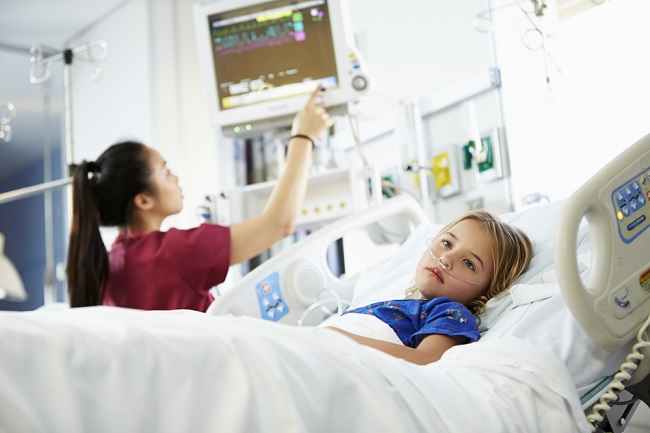PICU Room for Intensive Care of Children in Hospitals
PICU Room ( Pediatric Intensive Care Unit ) is an intensive care room in hospitals, for Children with serious health problems or who are in critical condition . A son children who are treated in PICU starting from babies age 28 days to children teens aged 18 years old.
Children who are treated in the PICU room will receive full supervision from general practitioners, specialist doctors, and nurses.

In addition, various health equipment is also provided in this room to treat the condition of a critical child. The duration of child care in the PICU room varies depending on the development of the child's health condition.
Condition of Children Who Need Care in the PICU Room
Children need to be treated in the PICU room if their medical needs cannot be met in the usual care room. Conditions that can be the reason for children needing care in the PICU room include:
- Serious respiratory problems, such as severe asthma, foreign body choking, pneumonia , and acute respiratory failure syndrome (ARDS).
- Serious infections, such as bacterial meningitis and sepsis.
- Shock and serious injury, for example due to a traffic accident, falling from a height, dehydration, heavy bleeding, burns, or electric shock.
- Disorders of the brain, such as tumors, coma, epilepsy, and status epilepticus.
- Severe metabolic disorders, such as electrolyte disorders, disorders of the acid base blood balance (alkaliosis and acidosis), and diabetic ketoacidosis.
- Blood disorders, such as severe anemia and blood cancer (leukemia).
- Poisoning with drugs or other chemicals, such as kerosene.
- Severe organ damage, such as kidney failure and liver failure, or severe heart abnormalities
- Birth defects.
Children who have just undergone major surgery, such as cardiac, nerve, orthopedic (bone) surgery, also ENT, or organ transplantation and amputation also require temporary recovery time in the PICU room, before being transferred to the general care room.
Medical Treatment and Equipment Available in the PICU Room
Just like an intensive care room (ICU) in a hospital, PICU rooms are also guarded 24 hours by a medical team that works alternately in the shift work system, to monitor and treat patients.
PICU rooms are generally kept calm, where not many people are allowed to visit, and there are fewer patients than general care rooms. The aim is for patients to avoid infection.
The medical devices contained in the PICU room include:
1. Infusion
Almost all of the children treated in the PICU room had an intravenous hose, to insert fluids, blood, and drugs through the blood vessels. This infusion is usually attached to the arm or hand, but sometimes it can also be attached to the child's feet, legs or scalp.
2. Central vein catheters ( c v enous c athlete )
To monitor a child's critical condition, the doctor may install a special hose on the child's neck. This tube will be placed in the heart vein (vena cava) through the neck, to monitor blood vessel pressure, blood flow stability and oxygen levels.
3. Special medicines
Certain medications can only be given to patients with special supervision, including pediatric patients in the PICU room. Examples of these drugs are dobutamine, dopamine, epinephrine , and morphine or fentanyl . Its usefulness varies, from helping heart function, maintaining blood pressure, to relieving pain.
4. Monitor vital signs
In the PICU room, there are various tools that are attached to the child's body and connected to the monitor screen to monitor the child's vital signs. Some of them are heart rate recorders (electrocardiogram), blood pressure, respiratory rate, body temperature, and oxygen (oximeter) levels.
5. Breath tool
In children who can breathe on their own, usually a hose or oxygen mask is attached to the nose or face, which is connected to an oxygen tube.
As for children who experience severe respiratory or coma disorders and cannot breathe on their own, the doctor will attach a ventilator to his respiratory tract. Previously, the doctor will first take an intubation procedure to attach a tube or tube (ETT) to the child's throat through the mouth. Then the pipe will be connected to the ventilator machine to help with breathing.
6. Heart shock device
Children treated in PICU have a high risk of experiencing cardiac arrest because of their critical condition. Therefore, child-specific cardiac shock devices must be available in the PICU room. This heart shock device will be used when the rhythm of a child's heartbeat starts to become irregular, or undetectable.
While in the PICU room, doctors will periodically carry out physical examinations of critical pediatric patients. If needed, the doctor will also do blood tests, urine, brain and spinal cord fluid, X-rays, or ultrasound.
The existence of a PICU room in a hospital is very important to help treat children with critical conditions. Pediatricians will recommend treatment in the PICU room if the child's condition needs to be monitored closely and treatment is needed as much as possible.
Label : Health
Comments
Post a Comment